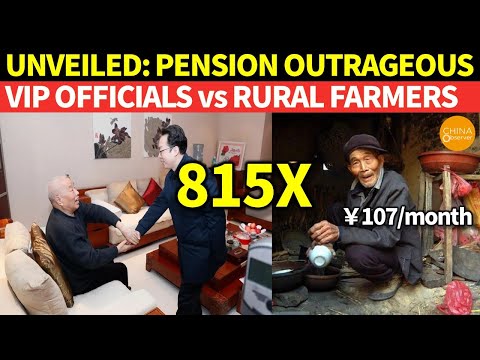Unveiled: China's Pension Outrageous! Rural Farmers Pension Only ¥107; 815X Less From VIP Officials

Check this out: this 78-year-old grandma from the rural parts of China gets a measly 107 yuan from the government each month, while some retired lieutenant general gets 87,000 yuan monthly. That's a crazy difference of 815 times. I get that the general did a lot of good stuff, but why does he get to have 30-40 times or even 100 times more than a poor old granny? This 815 times gap is just too much, don't you think? So, how did this issue come to light? It all started when a young blogger stumbled upon it. In March, he set out to interview elderly people on the streets of Chengdu to gauge what an average resident could afford with a day's pension. To his surprise, he met an elderly woman who had spent her entire life farming in the countryside. She moved to Chengdu in 2005 after her husband's passing to live with her engineer son and started working as a nanny, earning a meager 300 yuan a month. The woman mentioned that she also receives a monthly pension of 107 yuan from the government as part of the rural residents' insurance program. As the blogger was testing purchasing power,
he spent 120 yuan of his own money to buy rice, noodles, eggs, and pork for the elderly woman. While this amount of money and food would be sufficient for a single day, it was clear that it would be much harder to maintain over the course of a month. The young man turned his interview with the elderly woman into a video and posted it on the Chinese internet. The video quickly went viral and made it to the top of the trending
list. The video featuring the elderly woman was not the young man's first attempt to shed light on people's living conditions. In a previous video, he tested what 100 RMB could buy in response to rising prices. The video exposed the vast disparity between national prosperity and the struggles of ordinary people, given that the minimum wage in China is only 9 RMB per hour. Indeed, just presenting the facts was enough to make some people uneasy. The government
promptly deleted the video and banned the young man's account, even though he didn’t cross any lines or say anything inappropriate. As a result, he was made to vanish into thin air. The young man left a message in his last video saying that his actions are worthy of the education he received, and that the truth of this world is not just seen by his own eyes. Other netizens have expressed that if this had happened to an elderly woman in the United States, it would have been a hot topic across all major platforms for three days and three nights. Influential figures from various fields, including politics and humanities, would have
provided comprehensive analysis from all angles, leaving no stone unturned. The common people's daily lives have become a thorn in the side of government officials. In a meeting held by the Cyberspace Administration on March 12th, titled "Strictly Regulating the Chaos of Self-Media Special Action," it was emphasized that people should report any content that distorts the truth or falsifies history, and put an end to all methods of gaining traffic by exploiting impoverished people. this may seem like a genuine concern for the struggles of the people, it is clear that the true intention is to prevent any exposure of the reality behind the Chinese Dream: the goal of poverty alleviation, and the pursuit of a moderately prosperous society. If the young man had interviewed a retired cadre's spouse in a compound managed b a government agency, and showed what a month's pension could buy, such as touring old Beijing in a chartered ride, his account would not have been banned. In fact, his story could have been featured on China Central Television's program "Moving China" as a model case, celebrating the government's efforts to improve the livelihoods of retirees. This highlights the unequal treatment and bias that exists in the media towards
different social classes in China. The elderly woman in question is 78 years old this year and was born in 1945. Let's take a look at the life experiences of elderly people from this era, especially those living in rural areas. Indeed, the year she was born, China was still experiencing the aftermath of war. At the age of 14, she lived through the Great Leap Forward and the subsequent famine, which lasted until she was 17.
At 21, she experienced the Cultural Revolution, which lasted until she was 31. At the age of 33, she experienced the benefits of China's economic reforms and household contracting policy. This allowed her to finally have a slightly better quality of life. However, she still faced challenges such as agricultural taxes, which were not abolished until she was 61 years old. Now, at the age of 78, she receives a monthly pension of only 107 yuan, which is considered a "huge" amount for rural people. Relying solely on her monthly pension of 107 yuan, she cannot even afford to eat meat.She
fears that if she spends money on meat this month, she will not have enough to afford basic necessities next month and may have to go hungry for a day. One day, she met a kind-hearted young man on the street. Regardless of whether the young man was motivated by gaining online attention or truly had a kind heart, he bought 127.88 yuan worth of food for the elderly woman, including a few pieces of meat. Sadly, the young man who helped her lost his own hard-earned account, and all of his efforts went to waste. In time, people will forget about the young man and the elderly woman, as well as the countless other elderly people who face similar struggles.
The most terrifying aspect of this incident is not the young man's banned account or the removal of his video. Rather, it is the fact that there are millions of elderly people in China, such as the old woman who can only receive 100 yuan in monthly pension. According to recent data from the National Bureau of Statistics, there are over 50 million rural elderly people between the ages of 60 and 69 in China. These elderly people are working in the most arduous agricultural, forestry, animal husbandry, and fishery industries not out of passion for work, but because they have no other choice. If they stop working, they can only receive a maximum of 188 yuan per month in pension It's disheartening to see that elderly people in China are only receiving such a small amount of money for their basic needs. It is difficult to imagine how they can survive and maintain a decent standard of living with such a meager pension.
The pension plan implemented by the Chinese Communist government categorizes the population into two groups: urban workers and urban-rural residents. Urban workers receive more favorable treatment compared to urban-rural residents. Moreover, even within the group of urban workers, a notable difference in treatment exists between government employees and enterprise workers. Government employees receive better treatment than their enterprise counterparts. Here's an example: Before the Chinese New Year, the public WeChat account "Yingtan Social Security" issued a notice titled "The January 2023 Pension for City Retirees Has Been Issued." However, this notice caused public outcry and criticism
online due to the significant differences in pension amounts received by different groups of retirees. The notice listed the total amount of pension payments for three categories of retirees: "178.85 million yuan for 75,500 enterprise retirees, 69.09 million yuan for 13,600 government retirees, and 28.54 million yuan for 137,800
urban-rural residents who retired under the social security system." Based on the data released by Yingtan Social Security, some netizens have calculated the average monthly pension amount for retirees of different backgrounds in Yingtan City. They listed that "government retirees receive an average monthly pension of up to 5,080 yuan, while enterprise retirees receive an average of 2,368 yuan. Urban-rural residents under the social security system receive the lowest amount, with an average of only 207 yuan per month Netizens have questioned the fairness of the pension system, pointing out that the pension amount for government retirees is 24.5 times more than that of urban-rural residents. This is not an isolated case, but rather a widespread issue throughout the country. According to a report by China Jilin Network on January
10th titled "Changchun City: Ensuring the Timely Payment of Pensions, Unemployment Benefits, and Work Injury Insurance before the Spring Festival," netizens calculated that the average retirement benefits for government employees in Changchun City was 5,480.76 yuan, while the average retirement benefits for urban enterprise employees was 3,125 yuan, and the average retirement benefits for urban-rural residents under the social security system was 133.58 yuan. This means that the retirement benefits for government employees were 1.75 times higher than those for enterprise employees and 41 times higher than those for urban-rural residents. Why do retired government employees receive such high pension benefits? There are three reasons. The first is that the social security payment base for government employees and enterprise workers is different. Many enterprises pay social security contributions based on the minimum payment, and some even do not pay social security during the probation period.
However, government employees pay social security based on their actual salaries, which means they contribute more each month. Over time, these additional contributions accumulate and result in higher pension benefits. The second reason is that the calculation of service years for government employees is more clear and consistent. The length of service years before reform was also calculated. enterprises are generally less stable than
government agencies, and it is easy for employees to leave and interrupt their social security contributions, ultimately affecting the length of social security payment years and benefits. The final reason is that many government employees also receive supplementary annuity, in addition to social security pension insurance. While enterprises can also offer annuity, it is typically only the few large enterprises with strong financial capabilities that provide this benefit. Commentators pointed out that the Communist Party government, using taxpayer’s money, has taken retirement benefits of government employees seriously, while the enterprises that pay taxes often do not have enough funds to supplement their employees' pension benefits due to financial pressures. As for the rural and urban resident pension insurance, it is even less favorable compared to the pension benefits of enterprise employees and government workers. Although the number of people participating in rural and urban resident pension insurance is much larger than that of enterprise employees and government workers, the amount of financial support received is much smaller. Taking 2020 as an example, the financial subsidies received by rural
and urban resident pension insurance were 313.46 billion yuan, while the pension insurance for enterprise employees and government workers received 627.13 billion yuan and 544.84 billion yuan respectively during the same period. This explains why the actual pension benefits
received by rural and urban resident pension insurance participants are much lower than those of retired enterprise employees and government workers. Currently, the pension benefits for government officials are very high, while the pension benefits for enterprise employees are moderate, and the pension benefits for rural and urban residents are at the bottom. The retirement benefits for government officials are several times higher than those of enterprise employees, and dozens of times higher than those of rural and urban residents, highlighting how the Communist Party officials have become the biggest vested interest group in China. In democratic countries, presidents and officials who are elected by the people become ordinary citizens after leaving office. However, in mainland China, retired high-level officials still enjoy various privileges. Official data shows that there is a retired cadres' bureau in the Central Office of the Communist Party of China, as well as in the political departments of the Central Military Commission, and at various levels of local governments across provinces, cities, districts, and counties.
The retirement benefits for high-ranking officials in the Chinese Communist Party are astonishing and rare in the world. According to Trend Magazine in Hong Kong, the annual expenditure on retired high-ranking officials in the Chinese Communist Party exceeded 67.5 billion yuan in 2014. That year, the retirement benefits for high-ranking officials at the level of Politburo Standing Committee, National People's Congress Chairman, and Vice Chairman of the Chinese Communist Party amounted to 326 million yuan, with an average of 27.25 million yuan per person. Benefits for officials at other levels were allocated in a hierarchical manner,
resulting in a huge burden on the national treasury. Beijing 301 Hospital is an important healthcare base for the Chinese Communist Party and has been responsible for the medical care and health of high-level Communist Party officials for many years. On September 15, 2019, a WeChat advertisement from Beijing 301 Hospital went viral on Chinese social media, highlighting the "health project" of Communist Party leaders and revealing that the retirement goal for longevity was 150 years old. However, the advertisement was blocked the next day due to its sensitivity. The Chinese Communist Party has set up various schemes to provide super benefits to retired officials, and we can create another video to explore this topic. Here, we will continue
to discuss the official income that goes into their own pockets. In 2020, an online report revealed that a retired high-level official was receiving a monthly pension of more than 87,000 yuan. The individual was classified as a retired cadre, with an enlistment date of December 1, 1937, and held the rank of a Deputy Theater-level Major General. This is a very high rank, and the monthly income in their later years is vastly different from that of ordinary citizens. Out of the 87,000 yuan, retirement fee is 15,847 yuan, military professional allowance is 400 yuan, retired life subsidy is 8,200 yuan, housing subsidy is 250 yuan, honor fee is 130 yuan, and the welfare fee is extremely high at 62,280 yuan. It is unclear what kind of welfare benefits are included in this amount. Meal subsidy is 85 yuan, bringing the total
to 87,192 yuan. In addition, there is a housing provident fund with a balance of 9,775 yuan. This salary statement is likely to be true. Comparing this to the monthly retirement benefits of a Chinese farmer, which is only 107 yuan, the retirement income of a retired high-level Chinese Communist Party official is 87,192 yuan, 815 times that of a farmer. While retired high-level officials have made significant contributions to the country, it is not reasonable for their retirement benefits to be so much higher than that of ordinary citizens. Farmers receive only 107 yuan per month, and it would be understandable if retired Major Generals receive 30-40 times more, or even a 100-fold difference might be within the threshold, but the current gap of 815 times is too large. Aren't farmers
also citizens of China? Don't they pay taxes and contribute to the country? Why is there such a noticeable gap in benefits? These are important questions that need to be addressed in order to create a fair and equitable society. It is now clear that the retirement benefits for Chinese government officials are indeed very high. It's no wonder that so many people work hard to become government officials, just to secure their retirement. The gap in benefits is so large that it is quite shameful
that the Chinese Communist Party has treated farmers so unfairly, with retirement benefits as low as only 123 yuan. Some retired officials have more money than they can spend, while others do not have enough to support their retirement. Where is the promised common prosperity? The issue of elderly care is becoming increasingly prominent in small, unknown county towns, where more and more elderly people are living in poverty and even facing the prospect of not being able to receive basic life support. Many of their children work in other parts of the country, and government pensions are not enough to support the lives of these elderly people. Nowadays, a prosperous life in China is getting further and further away from the masses. Supermarkets can receive a large number of resumes from graduates for a job that pays only 6,500 yuan per month. Even though this
salary is not considered high, many young people say they would be satisfied with earning only 5,000 yuan per month. In today's market context, it is common to see people earning a monthly salary of 3000 yuan or less. This money is not just used for basic necessities like food and water, it also needs to be allocated for expenses such as mortgage payments, car loans, utilities, and healthcare. We previously saw that government officials are being laid off on a large scale, and now public sector workers such as doctors and teachers are also being encouraged to start their own businesses. Notices have been issued in many provinces, such as Guangdong and Yunnan, allowing grassroots workers to take on part-time jobs after work. From working at external exam centers to driving for ride-hailing companies like Didi, there are many opportunities available, as long as they do not ask for money from their employer. This is reminiscent of the
wave of people leaving their jobs and starting their own businesses in the 1990s. One netizen said that during the wave of layoffs in 2000, laid-off workers were given only 50 yuan per month for a year. Farmers are also citizens of China. The Chinese government has set high pensions for retired high-level officials and retired government officials, while rural residents only receive 107 yuan per month. The vast difference is very difficult to understand and raises questions about the legitimacy and legality of the Communist Party's political power. The reason why the Chinese government has banned this news is not because they are worried about people using vulnerable groups to gain attention. What they are really worried about is that people will emulate this behavior, and expose the very low incomes and difficult living conditions of many vulnerable groups, which will be widely spread on social media in China. This will be a slap in the face
of the Chinese Communist Party and will also arouse the anger of the masses which can be very detrimental to the Party’s control. The relevant authorities immediately banned all accounts and prohibited social media from producing programs related to this issue. This shows that the Chinese Communist Party knows how much the Chinese people are suffering, yet they are afraid that the truth will be exposed. This matter is far from over. Dear viewers, what are your thoughts on the video that revealed that Chinese retirees are receiving only 107 yuan per month, and how it was subsequently removed from the internet? The people of China are aware of the current situation, so who is the government trying to deceive by covering it up? We welcome comments and discussions. If you like our channel, please don't forget to hit the notification bell and share it with like-minded people.
2023-04-01 05:52


